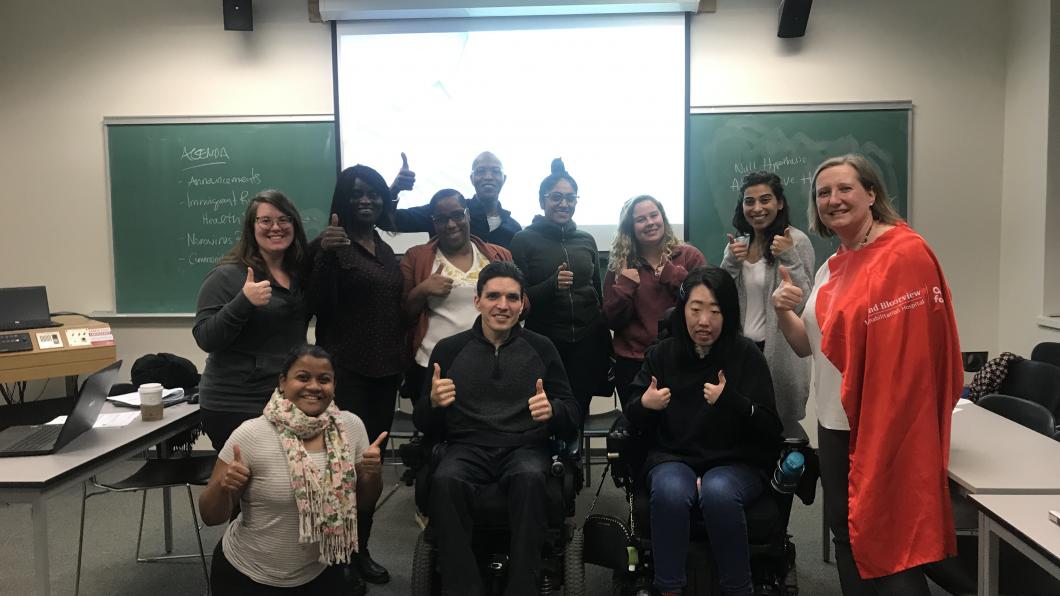
Family as Faculty teaches client‐centred care at U of T
For Dr. Keith Adamson the voices of families and clients seemed to be lacking in the academic space.
After consulting members of the disability community, Dr. Adamson, a social work professor at the University of Toronto, realized that they weren’t doing enough to teach a client- and family-centred approach.
He set out to change that.
Along with Surrey Place, Holland Bloorview, U of T, and UHN, Dr. Adamson collaboratively created a course and curriculum that allowed families and clients with lived experiences to co-lead a Master’s level social work class at the university.
He called it Social Work and Disability Practice: A Client and Family-Centred Approach.
“I really wanted to create a course that honours the voices of clients and families within the system,” he says.
Dr. Adamson co-lead the course alongside families or clients through Holland Bloorview’s Family as Faculty Training Program.
The program is one of the hospital’s latest initiatives that elevates family and client voices in an educational setting—whether in a school, a workshop, or a presentation—and it’s the first known program of its kind in Canada.
Through this nine-module teaching and facilitation course, participants are trained at Holland Bloorview on how to co-teach content with a formal instructor, facilitate group conversations in a school environment, and run simulations with students.
And, recognized as experts, they get paid to do so.
“In the world of patient partnering and patient engagement, across the healthcare system, there is this growing camp that says, ‘Actually we value the family’s input so much that we should be compensating them for their contributions and for sharing their experience,” adds Jean, a Family Partnerships Specialist and Family Leader, involved with Family as Faculty, at Holland Bloorview.
“So, this has been on our radar for a while and we felt the best place to start that was when we asked family leaders to teach students or staff.”
This year eight families and clients taught alongside Dr. Adamson, every Monday evening.
And Emily, who is a Holland Bloorview alumna and current volunteer, and one of Keith’s students, saw great value in the course.
“Being able to bring in families with such a rich insight and applying that to a learning context brought a new dimension to the content that we were learning,” she says.
“We were really able to benefit from that dialogue because not only were we able to hear their stories, we were able to interact with them, ask questions, and use that information to inform how we as future clinicians will go about our practice.”
Topics that families helped facilitate included language barriers, being a newcomer to Canada, racism, intersectionality and disability, the complexity of how to navigate the system, and sexuality and disability.
“We had a whole unit on sexuality: a subject that many in the disability world believe isn’t dealt with at all when it comes to their healthcare,” adds Dr. Adamson.
“To put sexuality in the curriculum will contribute to informing social work students on how to talk about sexuality, as well as show that they need to talk about sexuality with their clients who are disabled. In the long run this type of pedagogical approach should translate into improved services for clients and their families.”
The first Family as Faculty cohort has successfully wrapped up their first semester and Dr. Adamson could not be more pleased with its inaugural year. He looks forward to more semesters of family-led classes, but also hopes the course acts as vehicle for social change.
“All course content, learning objectives, learning activities, and student assessment methods were constructed to honour the family’s lived experience. They felt like we were making a significant contribution and I think they felt like their contribution was valued,” he says.
“We really do hope that more courses, not just in social work, but in other universities build curriculum that honours them as well.”